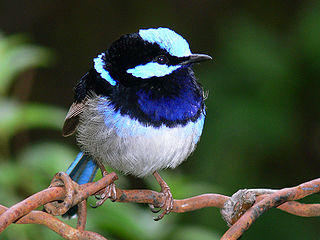
The Australasian wrens are a family, Maluridae, of small, insectivorous passerine birds endemic to Australia and New Guinea. While commonly known as wrens, they are unrelated to the true wrens. The family comprises 32 species in six genera.

Threatened fauna of Australia are those species and subspecies of birds, fish, frogs, insects, mammals, molluscs, crustaceans, and reptiles to be found in Australia that are in danger of becoming extinct. This article lists species classified as threatened species under the Commonwealth Environment Protection and Biodiversity Conservation Act 1999.
Ian Cecil Robert Rowley was an Australian ornithologist of Scottish origin. He was born in Edinburgh and educated at Wellington College and Cambridge University. Following service in the Royal Navy during the Second World War, he moved to Australia in 1949 and graduated in agricultural science from the University of Melbourne under the Commonwealth Reconstruction Training Scheme.
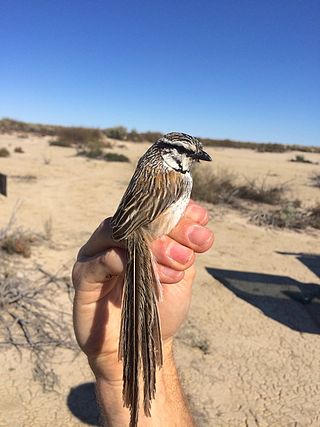
The grey grasswren is a passerine bird in the Australasian wren family, Maluridae. It is found on arid inland floodplains of Australia where it is endemic. The grey grasswren is a rarely seen elusive bird that was first sighted in 1921 but not taxonomically described until 1968. Its greyish coloration and very long tail distinguish it from all other grasswrens. While some recent research has been conducted, there still remain many gaps in the knowledge about the ecology of this cryptic bird.

Grasswrens (Amytornis) are a genus of birds in the Australasian wren family, Maluridae.

The Eyrean grasswren is a small grasswren from the Passerine family Maluridae. This is a cryptically plumaged and uncommon bird endemic to arid regions of Central Australia. The species was discovered by F.W. Andrews in 1874 around the Macumba River at Lake Eyre, and named after the South Australian Surveyor General George Woodroffe Goyder.
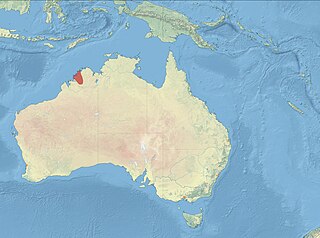
The black grasswren, known as dalal to the Wunambal people, is a species of bird in the family Maluridae. It is endemic to Western Australia.
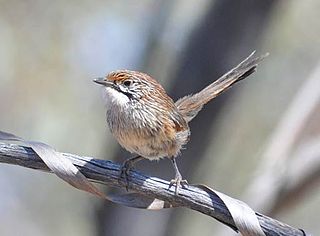
The striated grasswren is a small, cryptically coloured ground-dwelling species of wren-like bird in the family Maluridae, endemic to Australia. It occupies a large discontinuous range across arid and semi-arid areas of western, central and southern Australia where it is associated with spinifex (Triodia) grass.
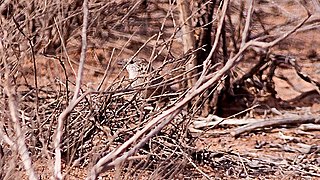
The thick-billed grasswren is a species of bird in the family Maluridae. It is endemic to Australia. Its natural habitat is Mediterranean-type shrubby vegetation.

The orange-crowned fairywren is a species of passerine bird in the Australasian wren family, Maluridae. It is monotypic within the genus Clytomyias. It is found on New Guinea in its natural habitat of subtropical or tropical moist montane forests.
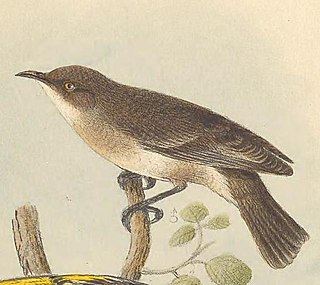
The grey honeyeater is a species of bird in the honeyeater family. It is an uncommon and little-known bird, an often overlooked endemic of remote areas in central Australia.

The white-shouldered fairywren is a species of bird in the Australasian wren family, Maluridae. It is found in New Guinea.

The red-backed fairywren is a species of passerine bird in the Australasian wren family, Maluridae. It is endemic to Australia and can be found near rivers and coastal areas along the northern and eastern coastlines from the Kimberley in the northwest to the Hunter Region in New South Wales. The male adopts a striking breeding plumage, with a black head, upperparts and tail, and a brightly coloured red back and brown wings. The female has brownish upperparts and paler underparts. The male in eclipse plumage and the juvenile resemble the female. Some males remain in non-breeding plumage while breeding. Two subspecies are recognised; the nominate M. m.melanocephalus of eastern Australia has a longer tail and orange back, and the short-tailed M. m. cruentatus from northern Australia has a redder back.

The blue-breasted fairywren, or blue-breasted wren, is a species of passerine bird in the Australasian wren family, Maluridae. It is non-migratory and endemic to southern Western Australia and the Eyre Peninsula in South Australia. Exhibiting a high degree of sexual dimorphism, the male adopts a brilliantly coloured breeding plumage, with a bright blue crown, ear coverts and upper back, red shoulders, contrasting with a dark blue throat, grey-brown tail and wings and pale underparts. Non-breeding males, females and juveniles have predominantly grey-brown plumage. No separate subspecies are recognised.
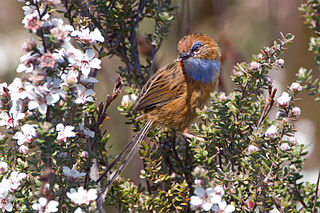
The southern emu-wren is a species of bird in the Australasian wren family, Maluridae. It is endemic to Australia. Its natural habitats are temperate forests, and Mediterranean-type shrubby vegetation, and swamplands.

The mallee emu-wren is a species of bird in the Australasian wren family, Maluridae. It is endemic to Australia.

The rufous-crowned emu-wren is a species of bird in the Australasian wren family, Maluridae. It is endemic to Australia.
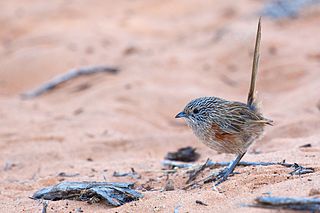
The western grasswren, formerly known as the textile wren, is a species of bird in the family Maluridae. It is endemic to Australia. It was formerly lumped as the nominate subspecies of the thick-billed grasswren.
The sandhill grasswren is an insectivorous bird in the Australasian wren family Maluridae. It is found in sandplain deserts and mallee of central Western Australia to central Queensland as well as northwest and southern South Australia. It was formerly considered to be conspecific with the Pilbara grasswren.
















